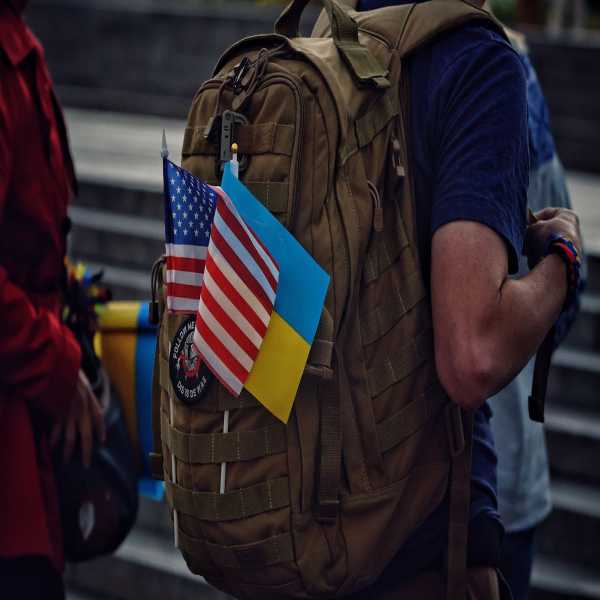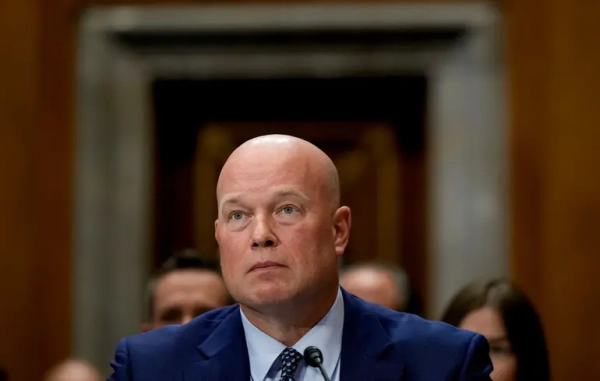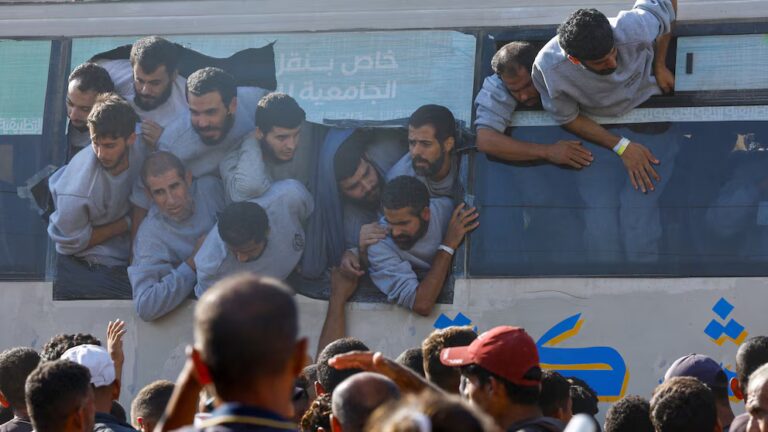In the US and across Europe, politics are complicating support for Ukraine.

The flags of Ukraine and the United States are attached to a backpack on October 1, 2023, in Kyiv, Ukraine. Yan Dobronosov/Global Images Ukraine via Getty Images Jen Kirby is a senior foreign and national security reporter at Vox, where she covers global instability.
Western unity around Ukraine is starting to strain as the conflict grinds on with largely static front lines, and as the politics in the United States and Europe become more volatile themselves.
Last weekend, in the US, Congress avoided a government shutdown, but only after it dropped billions in Ukraine aid from its short-term spending bill. Now, lawmakers who back Kyiv are scrambling to figure out how they can get Ukraine more funding as a faction of the GOP digs in against it.
From both the US and Europe, support for Kyiv is still forthcoming, of course. But it is not quite the all-in, unequivocal support that characterized the first year of the war. In 2022, the shock of the Russian invasion, and Ukraine’s initial success in repelling Russian forces from Kyiv, then later liberating its territory, sharpened the sense of purpose among Western countries, and tamped down some of the competing political interests within them. They also eased some of the tensions that have long complicated trans-Atlantic and European relations.
That’s evident in Slovakia, where this weekend’s elections saw Robert Fico, a former prime minister and pro-Russian populist, become the frontrunner to lead after running a socially conservative, left-wing populist campaign that promised to end military aid for Ukraine. Meanwhile, in Poland, upcoming elections have heightened trade tensions with Ukraine over grain, and a far-right party that has questioned the ruling party’s support for Ukraine could be a kingmaker. The circumstances and dynamics in these countries are wildly different, but together they’re undermining the West’s unified front.
For Ukraine, fighting a grinding counteroffensive and trying to shore up longer-term support against Russia, this all looks a bit distressing. But the continuation of that ironclad Western unity was never guaranteed — and in some ways wasn’t a completely natural fit, especially in Europe, where politics, history, and economics sometimes made it difficult to neatly sort countries into pro-Russia or pro-West camps.
This is still very far away from a rejection of Ukraine’s cause. Together, these countries see Russia as a threat, and largely believe their security and geopolitical interests align with helping Ukraine. But economic and energy pressures, political opportunism, and electoral politics are becoming harder to overcome, especially as Ukraine’s counteroffensive remains without a major breakthrough. At least for now, Western policies toward Ukraine look set to stay much more fraught.
Slovakia is a “cold shower for Western unity” — but it’s also not time to freak out yet
In Slovakia, Robert Fico’s Smer-SD party won the most votes (a little more than 20 percent), promising to focus more on cost-of-living issues like the economy and energy, rather than on the Ukraine conflict. Fico promised to end military aid — “not a single round” — to Ukraine.
“We are prepared to help with the reconstruction of the state, but you know our opinion on arming Ukraine,” Fico told reporters after the election. He also said he would seek to start peace talks.
Fico did not win outright, so he will need to form a coalition with other political parties if he seeks to lead, and that may ultimately force him to temper his pro-Russia, anti-EU stance.
But the election result, said Teona Lavrelashvili, policy analyst at the European Policy Centre, “also indicates [the] starting of a cold shower when it comes to Western unity towards Ukraine.”
Slovakia is an EU and NATO member, and its previous government had been a strong supporter of its geographical neighbor, Ukraine. It was one of the first countries to deliver fighter jets to Kyiv, and the country is hosting more than 100,000 Ukrainian refugees.
Still, Slovaks have been divided on the war, including polls from earlier this year that show the public more or less evenly split on who is responsible for the war in Ukraine — Russia, or the West and Ukraine itself. In Slovakia, pro-Russian sentiment is not a new phenomenon; many in the public have traditionally held positive views of Moscow.
“Most Slovaks most likely made their decisions based on the economic concerns, including [Fico’s] voters,” said Alena Kudzko, vice president for policy and programming at GLOBSEC, a think tank in Bratislava. “But definitely this convenient explanation that [Fico] offered — meaning that if only we can stop the war in Ukraine, the situation in Slovakia will get better, and by the way, that is better for Ukrainians; they will stop dying — that definitely fell on propitious grounds in Slovakia.”
Fico has been viewed as a potential ally for Viktor Orban, the right-wing Hungarian leader who’s also sympathetic to Putin and has pushed back against the EU’s positions, including on Russia. European decision-making runs on consensus, so the more oppositional voices, the more complicated the politics will be.
But as experts pointed out, Fico is, above all else, a pragmatist. He served as Slovakia’s prime minister from 2006 to 2010, and from 2012 to 2018, before being forced to resign amid a scandal over a murdered journalist. In the past, he balanced Slovakia’s relationships with the EU and Russia.
That was a lot easier to do before Russia’s full-scale invasion, but it also means Fico is unlikely to go all in for Vladimir Putin. Slovakia, a country of about 5.5 million people, is deeply intertwined with the EU, and is dependent on the EU for its economy, its politics, and its security. “I think you can do slogans for billboards,” said Pavol Demeš, a visiting distinguished fellow at the German Marshall Fund and former Slovakian foreign ministry official. “But in real life, things are intertwined.”
Welcome to the new normal for Ukraine aid
Fico has promised no new military aid to Ukraine, but as experts point out, this doesn’t really mean much, since Slovakia pretty much delivered to Ukraine all it has to give. This is true for Poland, too, whose leaders said recently that Warsaw would cease sending weapons to Ukraine until it resolved a dispute over the transport of Ukrainian grain, which leaders say is hurting Polish farmers.
These promises, however, are an easy rhetorical flex when trying to win over skeptical voters, or prove you’re looking out for constituents’ economic interests.
The war in Ukraine did have economic fallout on the continent, and inflation and high energy prices are squeezing voters. That’s true elsewhere in Europe, where populist, far-right, and more pro-Russia parties are gaining ground, including in places like Germany. What is happening in Slovakia and Poland is likely a harbinger for more difficult politics to come.
“The Ukraine fatigue will be visible across the board in Europe,” Kudzko said. “Again, it does not mean that it’s not overcomable, or that it encapsulates in the majority of the population. But of course, after years of economic duress — which, by the way, started all the way back during Covid — the population comes to a certain level of fatigue.”
Looming around it all is what is happening in the United States. Washington has delivered more than $76 billion in assistance to Ukraine, including about $44 billion in security assistance to Kyiv since Russia’s full-scale invasion. As of September, the EU has committed about $88 billion in aid. Europe’s commitments to Ukraine now exceed those of the United States, especially for longer-term aid.
But you wouldn’t know that if you listen to some Republicans. A growing contingent within the GOP is questioning Ukraine’s counteroffensive progress against Russia, and where all this US aid money is going.
Congress averted a shutdown this weekend, passing a continuing resolution to continue funding the government — at least for the next 45 days, so lawmakers can once again engage in this showdown before the end of the year. But most notably, $6 billion in Ukraine aid was left out of this stopgap measure, leaving a question mark again as to whether the US will provide additional assistance for Ukraine this year.
That $6 billion was already a scaled-back version from the administration’s request for about $24 billion, and the omission of the aid package comes after Ukrainian President Volodymyr Zelenskyy visited Washington and Capitol Hill in person to lobby for aid.
President Joe Biden is urging Congress to pass this Ukraine aid, and it does have bipartisan support. But the political jockeying over Ukraine aid is a symptom of the US’s broader political dysfunction, which is probably not reassuring to Ukraine, or any of its European allies, either.
And American support for Ukraine might get even more complicated. Ukraine skepticism is growing amid Republicans, including voters. The GOP frontrunner Donald Trump is chief among them. This strain in the GOP, then, is probably not going away, and may morph beyond battles over Ukraine funding into fundamentally questioning the US’s position on Ukraine.
Questioning aid for Ukraine — especially the utility, and the escalatory potential of weapons assistance — is justified, here in the US and in Europe. But in the past year, Ukraine’s supporters could more easily make the case for it: Ukraine was winning, defying the odds even, and Russia’s military was in complete disarray. The Western strategy looked like it was working.
This year has tested that. The war is not quite static, but Kyiv’s counteroffensive has failed to make substantial gains. While Ukraine has had success, selling a slow, expensive grind to the public is a lot harder than selling stunning military victories. And while governments tried to mitigate the pain the war created for their populations, that is harder to do the longer the fallout continues.
This is especially true in Europe, with war on the continent. Europe’s support is robust, but when it comes to weapons, EU arsenals can’t make up the shortfall if America drops out. And if overall American assistance lags, it’s not clear the EU can make up that shortfall — or if they will be able to make the political case to the public that they should.
That case is also getting harder to make in the US — to say nothing of the rest of the world, parts of which have been far more skeptical of the Western narratives around the Ukraine war. It comes at a precarious moment for Ukraine, which relies on this outside aid for assistance, and it is a boon for Vladimir Putin, who always has sought to exploit the cracks in Western unity and is likely looking to target US political divisions for Moscow’s benefit. These developments were not unpredicted — but what is, at least right now, is how they will influence the war still raging in Ukraine.
Sourse: vox.com






